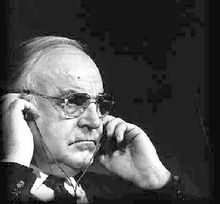West German Chancellor Helmut Kohl is in Washington D.C. for four days of meetings.
西德總理赫爾穆特·科爾在華盛頓哥倫比亞特區(qū)參加為期四天的會議。
Among the issues on his agenda are economic relations with the US and Germany's policy towards southern Africa.
其議程所涉及的問題包括與美國的經(jīng)濟關(guān)系以及德國對非洲南部的政策。
But today, Kohl's talk with President Reagan was dominated by the recent US-Soviet summit meeting in Iceland.
但今天,最近在冰島舉行的美蘇峰會卻主導(dǎo)了科爾與里根總統(tǒng)的談話內(nèi)容。
NPR's Brenda Wilson reports.
NPR布倫達·威爾遜報道。
While no major agreement was signed by the United States and the Soviet Union in Reykjavik,
雖然美蘇雙方在雷克雅未克并未簽署任何重大協(xié)議,
the two countries made progress in arms control talks in areas that are a central concern to America's European allies.
但兩國在一些地區(qū)的軍控方面取得了談判進展,而這些地區(qū)恰是美國與其歐洲盟國的核心問題。
Those particular areas involve disarmament proposals made in Iceland, affecting medium--range missiles and long--range missiles over which allies have voiced some reservations.
這些特別區(qū)域涉及在冰島提出的裁軍建議,內(nèi)容關(guān)于中程及遠程導(dǎo)彈,盟國已對這些提議提出了保留意見。
This was a major topic of discussion with Chancellor Kohl today,
這是今天與科爾總理討論的一個重要議題,
even though his Foreign Minister was briefed by the US Secretary of State only last week.
盡管他的外交部長剛剛在上周聽取了美國國務(wù)卿方面的消息。
In remarks welcoming Chancellor Kohl, President Reagan sounded a positive note, saying that there was ample reason for optimism.
在歡迎科爾總理的致辭中,里根總統(tǒng)表達了積極看法,他說,我們有充分的樂觀理由。

"When the next agreement is finally reached with the Soviet Union,
“當與蘇聯(lián)最終達成下一個協(xié)議時,
and I say when, not if, it will not be the result of weakness or timidity on the part of Western nations.
我說,什么時候,如果不是,它將不是西方國家軟弱或膽怯的結(jié)果。
Instead, it will flow from our strength, realism and unity."
相反,它將從我們的力量、現(xiàn)實主義(精神)和團結(jié)統(tǒng)一中流露出來。”
The President also explained that achieving such an agreement would depend upon pushing ahead with his Strategic Defense Initiative,
總統(tǒng)還解釋說,達成這樣的協(xié)議將取決于戰(zhàn)略防御計劃
SDI, because it offered protection against cheating.
(SDI)的推進情況,因為它能防范欺騙行為的發(fā)生。
But members of NATO, including Germany, have expressed concern that eliminating medium-range missiles in Europe as was proposed in Reykjavik
但包括德國在內(nèi)的北約成員國,都表示了擔憂。他們擔心在雷克雅未克提出的歐洲停用中程導(dǎo)彈一事,
would potentially leave Europe vulnerable to the Soviet shorter--range missiles and greater superiority in conventional forces.
可能會使歐洲受到蘇聯(lián)較短射程導(dǎo)彈的威脅,使其無法施展更大常規(guī)力量優(yōu)勢。
They expressed doubts that SDI could make up for those deficiencies.
他們對SDI能否彌補這些不足表示了懷疑。
The allies, in particular West Germany,
同盟國家,特別是西德,
want reductions in medium-range missiles tied to reductions in shorter-range missiles and conventional forces.
想要降低中程與短程導(dǎo)彈及常規(guī)力量的削減力度。
Chancellor Kohl was expected to press these points and to urge President Reagan to compromise on SDI to keep talks between the US and the Soviets moving.
科爾總理會強調(diào)這些要點,并敦促里根總統(tǒng)在SDI上達成妥協(xié),繼續(xù)推動美蘇談判進展。
Speaking through an interpreter in his arrival remarks, Kohl did not mention SDI,
在科爾總理的到來演講中,他并沒有提到SDI,
"It remains our goal, and I know that I shared with you, Mr. President,
“這仍然是我們的目標,我知道我與你看法一致,總統(tǒng)先生。”
to create peace and security with ever fewer weapons.
減少武器,創(chuàng)造和平與安全。
In Reykjavik, thanks to your serious and consistent efforts in pursuit of peace,
在雷克雅未克,感謝你們?yōu)樽非蠛推剑龀稣J真而不懈的努力,
a major step was taken in this direction.
朝這個方向邁出了重要的一步。
And we must now take the opportunities that present themselves without endangering our defensive capability."
我們現(xiàn)在必須抓住機會,而不危及我們的防御能力。”
After the meeting between Kohl and the President,
科爾總理與總統(tǒng)會晤后,
a senior administration official quoted Kohl as saying that he has always been in favor of the Strategic Defense system.
一位高級行政官員援引了科爾的話說,他一貫支持戰(zhàn)略防御系統(tǒng)。
At the White House, I'm Brenda Wilson.
我是布倫達·威爾遜,白宮(發(fā)回報道)。



